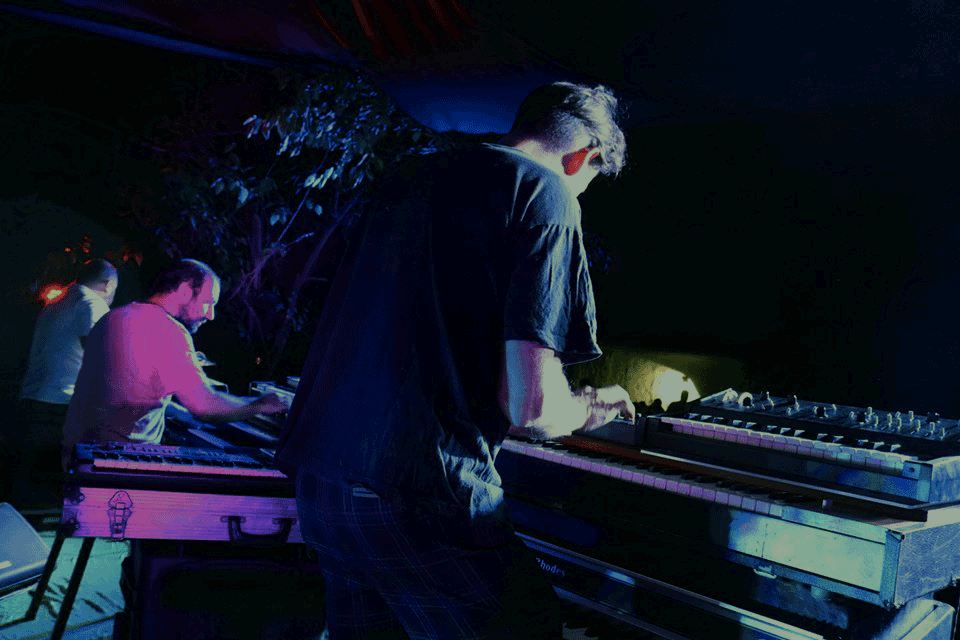Roberto Marconi created a Facebook group to find others who shared his fanaticism for the world of early keyboards. In doing so, he opened an unexpected door towards knowledge, recommendations, and connections with musicians, both professionals, and amateurs. What started as a virtual space of curiosity turned into a group of friends who gather once a year to play music, hang out and share their keyboards and synthesizers. Today, the group has more than 7 thousand followers, and more than 50 members assist the annual encounters that are expected to continue after the pandemic.
“It is well known that Facebook is a lot more than social media used to connect with friends. A fundamental aspect of Facebook is that groups are created around shared interests to gather people that don’t necessarily know each other. It is surprising how a particular interest, which could be initially expected to represent a small niche, manages to assemble so many followers. So when I created the group Teclados Vintage, in December 2014, I never thought it could turn into such a big group and an important gathering point for Chilean and Spanish speaking keyboarders around the world.
My interest in keyboards started at the beginning of the ’90s. When I was 15 years old, a classmate showed me some music that had an impact on my teenager’s sensibility. It was Cuadros de una exposición (cassettes back then had their titles in Spanish), from Emerson, Lake and Palmer, and Oxígeno from Jean – Michel Jarre. From that moment on, I became obsessed with those sounds, which I later discovered to be organs and synthesizers from the ’70s. I didn’t like the digital keyboards that were available in the market, used at the time for popular music. I always liked the old keyboards. It wasn’t about nostalgia, because they’re instruments and sounds from before I was born. However, it was then that my fondness for finding and acquiring old keyboards started, and with them, playing eternal improvisations of progressive rock (or something unclassifiable) with my friends.

Time after that, when I created my Facebook account in 2012, I discovered a lot of people that, just like me, were interested in keyboards. Most of the posts I read were conversations about software, midi controllers, and brand new plastic keyboards that were not mainly my taste (I never used a midi). So I decided to create a group, oriented specifically towards old keyboards. The word I chose was “vintage”, maybe not such a concrete concept, but it resumed what I was looking for. “Old” didn’t represent what I wanted to convey; neither did “antique” or “analog.” An accurate title would have been “keyboards from the ’60s, ’70s, and ’80s,” but it was too long. “Vintage”, however, has a connotation of fondness towards all those things that are not antique despite the years they might have. They have a life ahead of them. My interest in vintage keyboards has always been about the sounds that can be made with them, so I don’t see them as an antique collector would.
From the beginning, the group grew fast, with members not only from Chile but also from Argentina, Venezuela, Spain, etc. Something that motivated people to participate was the weekly thematic specials. For example, in the Hammond week or the Rhodes week, in addition to posting classic examples of the use of these keyboards, we uploaded our videos when we found an accessible model and played it. We also made contests of music made with vintage keyboards, with excellent prices, and then the Vintage Keyboards Gatherings began.
I think the most valuable asset of the group is its members. Daily, keyboarders (amateurs, professionals, and everyone in between), or even keyboard fans, share photos, videos, articles, questions, and pieces for sale, improvisations, or compositions made by them. Famous keyboarders like Chileans Cuti Aste, Eduardo Parra, Argentinian Ernesto Romero, among others, share their opinions and advice with others. Some, like Guillermo Morán and Ricardo Riadi participate with me as administrators and moderators. A very active and collaborating member, from the start, is the well known sound engineer Francisco Straub (famous for his work with Los Prisioneros). It is him who has been responsible for the production of the annual Vintage Keyboards gatherings. With all heart and enthusiasm, Pancho Straub managed to make the group develop from a bunch of unknown profiles from Facebook to a group of friends who get together face to face.

The first gathering was in January 2017; the second one happened in April of that year, the third one in 2018, and the fourth in 2019. This year, 2020, the fifth version was going to be in April, but it got suspended until further notice. At these gatherings, which have united more than 50 people, you eat, drink, talk, play live, and a lot of the assistants bring their treasures with keys and knobs. These events have been at Pancho’s backyard, with a mounted stage, high-level sound, and light systems. The gatherings have been a fundamental piece of the success the group has had because it has established itself beyond virtual space and has produced multiple collaborations that are born from true friendship.
We have witnessed a rebirth of analog synthesizers of different brands during the group’s lifespan, and more and more of their economic clones. It has been subject to debate on the group, since some are happy with these new products, and others – more purist – argue they don’t get close enough to the originals. Analog technology is back – quite like the vinyl discs return – and every day, there are more fans of its sound.

With physical gatherings being restricted due to the pandemic, weekly thematic specials have raised with vitality. The week of the mini synth, the week of the effect pedal, the week of covers. Depending on the subject, group members record their musical examples from home, making the most out of their spare time.
It might not be easy to understand for someone external, why keyboards provoke such fascination to gather more than 7 thousand people at a Facebook group. In fact, in the popular music world, the keyboarder figure has never been the most renowned. However, it is precisely the point of sharing the love of a somewhat unusual instrument and not being as numerous as guitar players, or bass guitarists, which unite us this much. Even more important than that is the humane quality of its members and the deep friendship we have developed. We will turn six years in November, and we have become a national and international point of reference. What happens if Facebook ends? We will find a way to keep the group together!

